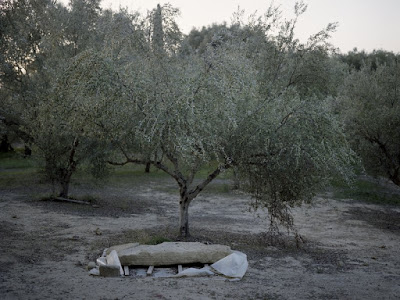 |
| Image source: Odyssey |
ONE MONTH AND WE ARE ALREADY EXHAUSTED
The eighteen wheeler tortoise stepped, jerked, fell back into place:
How can we do this day after day?
The Ozarks grow steeper, brush grass grayer, mice grow bolder inside our walls.
Some days you need to wear a helmet, fatigues.
Others, paper and pen well do, a tablet perhaps, a way to form context. .
Why not words to combat fallacy,
To write on a wall when there is no need for a wall,
Meditations to dissolve conflict?
In the battle of bullies and bullying leadership,
In the battle of superegos.
In the battle of grenade popping automatic weapon thinkers…
The semi reaches the top of the ridge,
Lowers its gears, slowly winds its way down to the hollow.
THE WALL IN QUESTION
A wall built on tumbleweed, spit, grasshopper larvae
Help us, people--help us understand—help us visualize--
I understand none of this. Is there a way I can know?
A wall built of bone marrow mortar and dog piss,
Violent thought and disconnection, the rapid fire
Of bullet cored brick. Help us understand where
This river enters the realm, where this river empties
Its blood to the valleys of snow, how the impact
Of dour men with raccoon hat hair suck away the core.
Michael H. Brownstein has been widely published throughout the small and literary presses. His work has appeared in The Café Review, American Letters and Commentary, Skidrow Penthouse, Xavier Review, Hotel Amerika, Free Lunch, Meridian Anthology of Contemporary Poetry, The Pacific Review, Poetrysuperhighway.com and others. In addition, he has nine poetry chapbooks including The Shooting Gallery (Samidat Press, 1987), Poems from the Body Bag (Ommation Press, 1988), A Period of Trees (Snark Press, 2004), What Stone Is (Fractal Edge Press, 2005), I Was a Teacher Once (Ten Page Press, 2011), Firestorm: A Rendering of Torah (Camel Saloon Press, 2012), The Possibility of Sky and Hell: From My Suicide Book (White Knuckle Press, 2013) and The Katy Trail, Mid-Missouri, 100 Degrees Outside and Other Poems (Kind of Hurricane Press, 2013). He is the editor of First Poems from Viet Nam (2011).
































